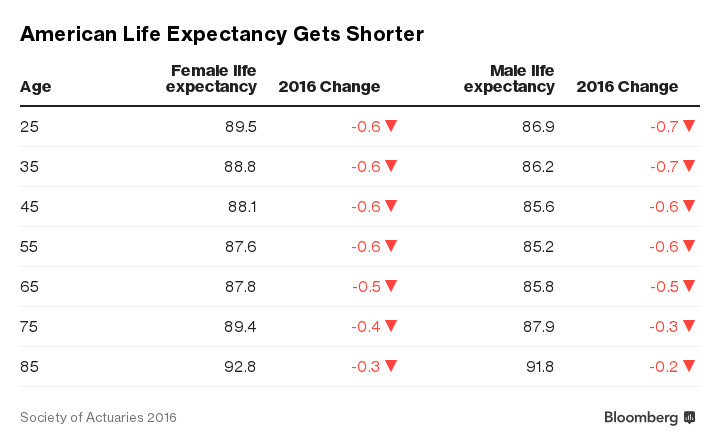Similar to the story we shared with you last week, the latest, best guesses for U.S. lifespans from a study released this month by the Society of Actuaries (people who manage risk, especially in insurance and pensions, analyzing the potential for undesirable events to occur and helping to plan for/avoid those events) is a bit disappointing: The average 65-year-old American man should die a few months short of his 86th birthday, while the average 65-year-old woman gets an additional two years, barely missing age 88.
Since the health of Americans has been deteriorating over the past several years, particularly that of middle-aged non-Hispanic whites, the life expectancy for 65-year-olds is now six months shorter than in last year’s actuarial study. A study from Princeton University lists drug overdoses, suicide, alcohol poisoning, and liver disease, as the main culprits.
But, longevity in younger Americans was also affected: Last year a 25-year-old woman had a 50/50 chance of reaching age 90 while this year, she is projected to fall about six months short.
Baby boomers, Generation X, and yes, millennials, are all doing worse.
From the article:
“the life expectancy for Americans at birth is 76 for men and 81 for women, according to the Centers for Disease Control and Prevention. But if you’ve already survived to middle age, you have a good chance of living much longer. The Society of Actuaries, and the American Academy of Actuaries, offer a longevity calculator that takes both your age and health into account.
Estimating longevity is as much an art as a science. The simplest way to calculate life expectancy is to look simply at how many people are dying at every age. If you want to know a 25-year-old’s chances of hitting age 100, you just calculate her statistical chances of getting through the next 75 birthdays unscathed.”
And again, the most recent data isn’t pretty:
- From 2000 to 2009, American death rates improved at 1.93 percent for men and 1.46 percent for women annually.
- From 2010 to 2014, that plunged to 0.6 percent for men and 0.42 percent.
But, this future only seems to apply to the poor. “According to research earlier this year in the Journal of the American Medical Association, a 40-year-old man in the top 1 percent can expect to live 14 years longer than his counterpart in the bottom 1 percent,” reports the article. And education- that’s important too. A college-educated 25-year-old can expect to live a full decade longer than someone who dropped out of high school at the same age.
If you’re trying to figure out how long you’re likely to live you’ll want to make sure you are healthy and well educated. That’s your best shot. But honestly, that’s something that everyone deserves.
Source: Bloomberg












